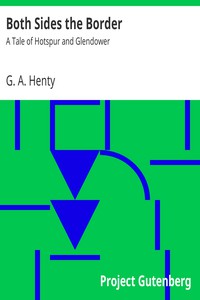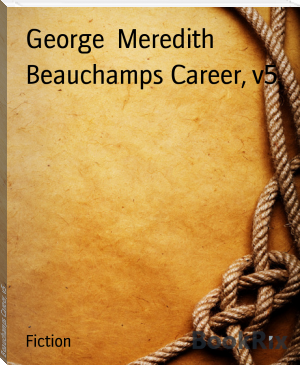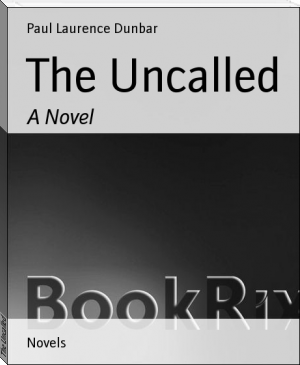Both Sides the Border: A Tale of Hotspur and Glendower by G. A. Henty (literature books to read .txt) 📗

- Author: G. A. Henty
Book online «Both Sides the Border: A Tale of Hotspur and Glendower by G. A. Henty (literature books to read .txt) 📗». Author G. A. Henty
Two days later, Oswald started for his promised visit to the Armstrongs. It was not considered necessary that he should be accompanied by any of the troopers, for Hiniltie lay but a few miles across the frontier. In high spirits he galloped away and, riding through Yardhope, was soon at Alwinton; and thence took the track through Kidland Lee, passed round the head of the Usmay brook, along the foot of Maiden Cross Hill, and crossed the frontier at Windy Guile. Here he stood on the crest of the Cheviots and, descending, passed along at the foot of Windburgh Hill; and by noon entered the tiny hamlet of Hiniltie, above which, perched on one of the spurs of the hill, stood the Armstrongs' hold. It was smaller than that of Yardhope, and had no surrounding wall; but, like it, was built for defence against a sudden attack.
Adam Armstrong was on good terms with his neighbours across the border. Although other members of his family were frequently engaged in forays, it was seldom, indeed, that he buckled on armour, and only when there was a general call to arms. He was, however, on bad terms with the Bairds, partly because his wife was a sister of Forster's, partly because of frays that had arisen between his herdsmen and those of the Bairds, for his cattle wandered far and wide on the mountain slopes to the south, and sometimes passed the ill-defined line, beyond which the Bairds regarded the country as their own. Jedburgh was but ten miles away, Hawick but six or seven, and any stay after the sun rose would speedily have brought strong bodies of men from these towns, as well as from his still nearer neighbours, at Chester, Abbotrule, and Hobkirk.
Oswald's approach was seen, and two of his cousins--Allan, who was a lad of about the same age, and Janet, a year younger--ran out from the house to meet him.
"We have been expecting you for the last ten days," the former exclaimed, "and had well nigh given you up."
"I hold you to be a laggard," the girl added, "and unless you can duly excuse yourself, shall have naught to say to you."
"My excuse is a good one, Janet. My father made a foray, a fortnight since, into the Bairds' country, to rescue some of the cattle they had driven off from our neighbours, some days before. There was a sharp fight, and Allan Baird was killed; and since then we have been expecting a return visit from them, and have been sleeping with our arms beside us. Doubtless they will come someday, but as it is evident they don't mean to come at present, my father let me leave."
"In that case we must forgive you," the girl said. "Some rumours of the fray have reached us, and my father shook his head gravely, when he heard that another Baird had been killed by the Forsters."
"It was not only us," Oswald replied. "There were some of the Liddels, and the Hopes, and other families, engaged. My father was chosen as chief; but this time it was not our quarrel, but theirs, for we had lost no cattle, and my father only joined because they had aided us last time, and he could not hold back now. Of course, he was chosen as chief because he knows the country so well."
"Well, come in, Oswald. It is poor hospitality to keep you talking here, outside the door."
A boy had already taken charge of Oswald's horse and, after unstrapping his valise, had led it to a stable that formed the basement of the house.
"Well, laddie, how fares it with you, at home?" Adam Armstrong said, heartily, as they mounted the steps to the main entrance. "We have heard of your wild doings with the Bairds. 'Tis a pity that these feuds should go on, from father to son, ever getting more and more bitter. But there, we can no more change a borderer's nature than you can stop the tide in the Solway. I hear that it was well nigh a pitched battle."
"There was hard fighting," Oswald replied. "Three of our troopers, and eight or ten of the others were killed. My father was twice wounded, one of the Hopes was killed, and a Liddel severely wounded. But from what they say, the Bairds suffered more. Had they not done so, there would have been a hot pursuit; but as far as we know there was none."
"The Bairds will bide their time," Armstrong said gravely. "They are dour men, and will take their turn, though they wait ten years for it."
"At any rate they won't catch us sleeping, Uncle; and come they however strong they may, they will find it hard work to capture the Hold."
"Ay, ay, lad, but I don't think they will try to knock their heads against your wall. They are more like to sweep down on a sudden, and your watchman will need keen eyes to make them out before they are thundering at the gate, or climbing up the wall. However, your father knows his danger, and it is of no use talking more of it. What is done is done."
"And how is your mother, Oswald?" Mistress Armstrong asked.
"She is well, Aunt, and bade me give her love to you."
"Truly I wonder she keeps her health, with all these troubles and anxieties. We had hoped that, after the meeting last March of the Commissioners on both sides, when the Lords of the Marches plighted their faith to each other, and agreed to surrender all prisoners without ransom, and to forgive all offenders, we should have had peace on the border. As you know, there were but three exceptions named; namely Adam Warden, William Baird, and Adam French, whom the Scotch Commissioners bound themselves to arrest, and to hand over to the English Commissioners, to be tried as being notorious truce breakers, doing infinite mischief to the dwellers on the English side of the border. And yet nothing has come of it, and these men still continue to make their raids, without check or hindrance, either by the Earl of March or Douglas."
"There are faults on both sides, wife," her husband said.
"I do not deny it, gudeman; but I have often heard you say these three men are the pests of the border; and that, were it not for them, things might go on reasonably enough, for no one counts a few head of cattle lifted, now and again. It is bad enough that, every two or three years, armies should march across the border, one way or the other; but surely we might live peaceably, between times. Did not I nearly lose you at Otterburn, and had you laid up on my hands, for well-nigh six months?"
"Ay, that was a sore day, for both sides."
"Will you tell me about it, Uncle?" Oswald asked. "My father cares not much to talk of it; and though I know that he fought there, he has never told me the story of the battle."
"We are just going to sit down to dinner, now," Adam Armstrong said, "and the story is a long one; but after we have done, I will tell you of it. Your father need not feel so sore about it; for, since the days of the Bruce, you have had as many victories to count as we have."
After dinner, however, Armstrong had to settle a dispute between two of his tenants, as to grazing rights; and it was not until evening that he told his story.
"In 1388 there were all sorts of troubles in England, and France naturally took advantage of them, and recommenced hostilities, and we prepared to share in the game. Word was sent round privately, and every man was bidden to gather, in Jedburgh forest. I tell you, lad, I went with a heavy heart, for although men of our name have the reputation of being as quarrelsome fellows as any that dwell on the border, I am an exception, and love peace and quiet; moreover, the children were but young, and I saw that the fight would be a heavy business, and I did not like leaving them, and their mother. However, there was no help for it, and we gathered there, over 40,000 strong. The main body marched away into Cumberland; but Douglas, March, and Moray, with 300 spears and 2000 footmen, including many an Armstrong, entered Northumberland.
"We marched without turning to the right or left, or staying to attack town, castle, or house, till we crossed the river Tyne and entered Durham. Then we began the war; burning, ravaging, and slaying. I liked it not, for although when it comes to fighting I am ready, if needs be, to bear my part, I care not to attack peaceful people. It is true that your kings have, over and over again, laid waste half Scotland; killing, slaying, and hanging; but it does not seem to me any satisfaction, because some twenty of my ancestors have been murdered, to slay twenty people who were not born until long afterwards, and whose forbears, for aught I know, may have had no hand in the slaughter of mine.
"However, having laden ourselves with plunder from Durham, we sat down for three days before Newcastle, where we had some sharp skirmishes with Sir Henry and his brother, Sir Ralph Percy; and in one of these captured Sir Henry's pennant.
"Then we marched away to Otterburn, after receiving warning from Percy that he intended to win his pennant back again, before we left Northumberland. We attacked Otterburn Castle, but failed to carry it, for it was strong and well defended. There was a council that night, and most of the leaders were in favour of retiring at once to Scotland, with the abundance of spoil that we had gained. But Douglas persuaded them to remain two or three days, and to capture the castle, and not to go off as if afraid of Percy's threats. So we waited all the next day; and at night the Percys, with 600 spears and 8000 infantry, came up. Our leaders had not been idle, for they had examined the ground carefully, and arranged how the battle should be fought, if we were attacked.
"Having heard nothing of the English, all day, we lay down to sleep, not expecting to hear aught of them until the morning. It was a moonlight night, and being in August, there was but a short darkness between the twilights; and the English, arriving, at once made an attack, falling first on the servants' huts, which they took for those of the chiefs. This gave us time to form up in good order, as we had lain down each in his proper position.
"A portion of the force went down to skirmish with the English in front, but the greater portion marched along the mountain side, and fell suddenly upon the English flank. At first there was great confusion; but the English, being more numerous, soon recovered their order and pushed us back, though not without much loss on both sides.
"Douglas shouted his battle cry, advanced his banner, fighting most bravely; as did Sir Patrick Hepburn, but for whose bravery the Douglas banner would have been taken, for the Percys, hearing the cry of 'a Douglas! a Douglas!' pressed to that part of the field, and bore us backwards. I was in the midst of it, with ten of my kinsmen; and though we all fought as became men, we were pressed back, and began to think that the day would be lost.
"Then the young earl, furious at seeing disaster threaten him, dashed into the midst of the English ranks, swinging his battle-axe and, for a time, cutting a way for himself. But one man's strength and courage can go for but little in such a fray. Some of his knights and squires had followed him, but in the darkness it was but few who perceived his advance.
"Presently three knights met him, and all their spears pierced him, and he was borne from his horse, mortally wounded. Happily the English were unaware that it was Douglas who





Comments (0)